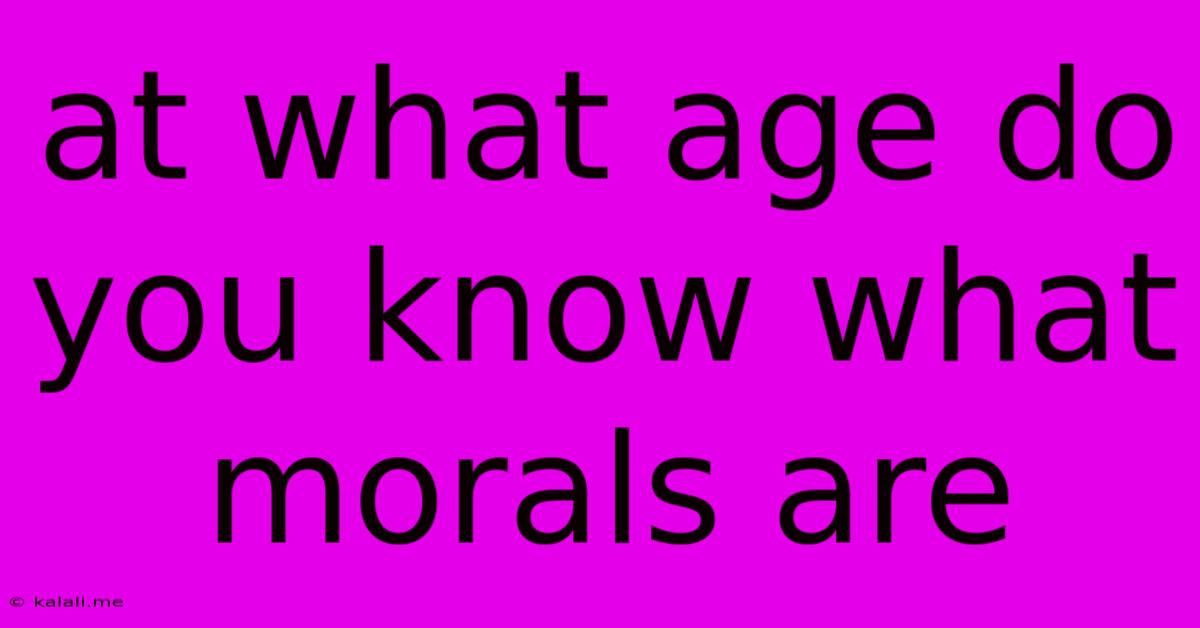At What Age Do You Know What Morals Are
Kalali
May 31, 2025 · 3 min read

Table of Contents
At What Age Do You Know What Morals Are? A Developmental Perspective
Understanding morality is a complex journey, not a single event marked by a specific age. While children may grasp basic rules of right and wrong early on, the nuanced understanding of morals, ethics, and their application in complex situations develops gradually throughout childhood and adolescence. This article explores the developmental stages of moral understanding, highlighting the factors influencing this crucial aspect of human development.
What are Morals, Anyway? Before diving into developmental stages, it's crucial to define our terms. Morals refer to an individual's sense of right and wrong, often rooted in societal norms, religious beliefs, or personal experiences. These principles guide our behavior and influence our judgments about ourselves and others. They differ from laws, which are externally imposed rules, and etiquette, which concerns social customs.
Early Childhood (Ages 2-7): Preconventional Morality
During this stage, children's understanding of morality is largely egocentric. They focus on consequences: actions are judged as "good" if they avoid punishment and "bad" if they lead to it. This is Kohlberg's preconventional level of moral development. For example, a young child might believe stealing is wrong primarily because they'll get in trouble, not because it's inherently unfair or harmful. At this stage, understanding of empathy and fairness is still developing.
Middle Childhood (Ages 7-12): Conventional Morality
As children grow, they internalize societal norms and expectations. Kohlberg's conventional level emerges, characterized by a desire to conform to rules and maintain social order. Children understand that good behavior pleases authority figures and contributes to social harmony. They begin to understand the importance of rules beyond simply avoiding punishment, although their reasoning might still be quite concrete. For instance, lying is wrong not only because it leads to consequences but also because it breaks trust and disrupts social harmony.
Adolescence (Ages 12-18): Postconventional Morality & Beyond
This is when the development of abstract reasoning allows for a more complex understanding of morality. Individuals may enter Kohlberg's postconventional level, recognizing that laws and rules are not absolute but can be flawed or unjust. They begin to develop their own ethical principles based on universal values like justice, fairness, and human rights. This period involves grappling with moral dilemmas and questioning societal norms. Moral reasoning becomes more principled, abstract, and based on individual conscience.
Factors Influencing Moral Development:
Several factors contribute to the development of moral understanding:
- Parenting Styles: Authoritative parenting (high warmth, high control) tends to foster better moral development than authoritarian (high control, low warmth) or permissive (low control, high warmth) styles.
- Socialization: Interactions with peers, teachers, and community members shape moral understanding through observation, learning, and negotiation.
- Cognitive Development: Abstract reasoning abilities are crucial for navigating complex moral dilemmas and developing personal ethical frameworks.
- Culture and Religion: Cultural norms and religious beliefs significantly influence moral values and their expression.
- Personal Experiences: Facing moral dilemmas and reflecting on personal choices can accelerate moral development.
Conclusion:
There's no single age at which moral understanding is fully developed. It's a continuous process spanning childhood and adolescence, influenced by a multitude of interwoven factors. While early childhood sees the foundation laid through understanding basic rules and consequences, adolescence brings the capacity for complex moral reasoning, challenging norms, and creating a personal ethical compass. The journey of moral development is a lifelong pursuit, a constant evolution of values and principles that shape who we are and how we interact with the world.
Latest Posts
Latest Posts
-
Rinse Cycle Washing Machine Not Working
Jun 02, 2025
-
Use In Contrast In A Sentence
Jun 02, 2025
-
What To Put Under Above Ground Pool
Jun 02, 2025
-
After Cutting Into Floor Joist Where To Locate Mending Plate
Jun 02, 2025
-
What Did It Take To Break Through Full Plate Armor
Jun 02, 2025
Related Post
Thank you for visiting our website which covers about At What Age Do You Know What Morals Are . We hope the information provided has been useful to you. Feel free to contact us if you have any questions or need further assistance. See you next time and don't miss to bookmark.